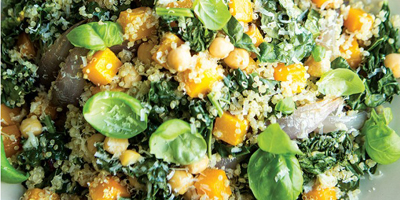You deserve better than a limp pile of iceberg lettuce. Make your salads delicious, creative, meal-worthy affairs with these tweaks.
We’re a little obsessed with salads. Not the boring, run-of-the-mill salads found at some restaurants—we’re talking about wow-worthy salads that actually fill you up, from quinoa curry to Caesar salad with sliced button mushrooms. So you can imagine our excitement when summer hits, and suddenly it’s salad season.
To celebrate, we’re sharing with you our dos and don’ts for making the most delicious, nutrient-rich salads ever. You can thank us later.
DON’T beeline to the iceberg lettuce. While still good for us, iceberg lettuce isn’t as nutrient dense as a lot of other leafy greens.
DO experiment with different types of lettuces and leafy greens, including kale, collards, romaine, frisée, arugula, radicchio, escarole, beet greens, and butter lettuce. Each variety is unique in flavour and its nutritional profile, so go wild and mix a few together.
DON’T douse your salad in one of those generic brand ranch dressings. (You know, the ones that aren’t even refrigerated when you buy them.)
DO choose a high quality dressing made with whole food, organic ingredients. Or try out one of our tasty recipes, such as the Everyday House Dressing, Mild Moroccan Spiced Dressing, Poppy Seed Dressing, or Honey Mustard Dressing.
DON’T let food go to waste. Whatever you’ve got in your fridge, throw it in your salad. Chop broccoli and cauliflower into teeny tiny florets, thinly slice Brussels sprouts, shred carrots on a cheese grater, and add diced fruit such as apples, pears, and even citrus segments. Add cheese, hard-boiled eggs, leftover chicken, and make your own croutons with near-stale bread.
DO add chocolate to your salad. (Did you go back and read that a second time?) Yep, chocolate is an excellent addition to salads (especially this one with strawberries and a chocolate vinaigrette).
DON’T be afraid to add different whole grains to your salads, such as quinoa, wild and brown rice, millet, spelt berries, wheat berries, and barley. Legumes such as lentils and chickpeas are another great addition to salads, upping the protein and fibre content to make it a full meal deal.
DO pack your salad in a jar, as we’ve done here with our Mason Jar Salads.
DON’T fear warm ingredients, such as steamed wild salmon and sautéed mushrooms. During the winter months, roast root vegetables in the oven with extra-virgin olive oil and seasonings and add to a green salad for a simple spin on a summer classic.

